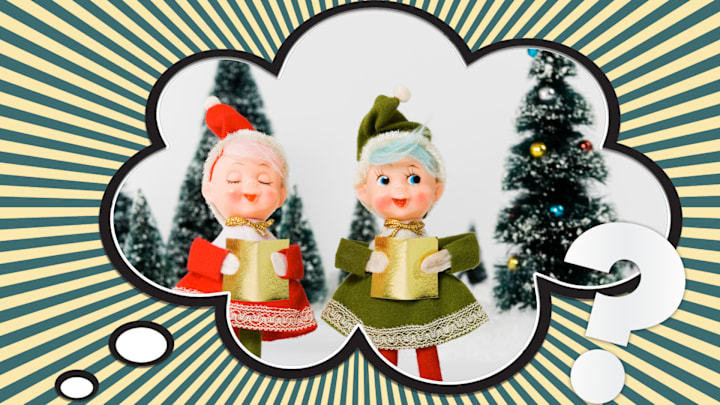From a cultural standpoint, there are quite a few seasons beyond the basic winter, spring, summer, and fall (football, awards, open, mating, etc.). The phrase ’tis the season, however, only refers to one of them: the holiday season.
But that wasn’t always the case.
Spring Gets the Shaft
Some of the oldest instances of ’tis the season from the 17th and early 18th centuries—when people frequently used ’tis as a contraction for it is—actually involve warm weather.
“[’Tis] the season of the year that calls to me,” Springlove says in Richard Brome’s 1641 play A Joviall Crew: Or, the Merry Beggars. As his name very unsubtly suggests, he’s talking about spring, when birdsong and other pastoral cues tempt him to become a vagabond until the weather grows too cold for wandering. In Richard Steele’s 1705 play The Tender Husband; Or, the Accomplish'd Fools, a character describes spring as follows: “Oh, ’tis the Season of the Pearly Dews, and gentle Zephirs.”
Poets and songwriters well into the 19th century continued to deploy ’tis the season to celebrate springtime and all the renewal, beauty, hope, and romance it signaled after a long, hard winter.
Here’s an example from 1828:
“’Tis the season of joy and delight,
The season of fresh-springing flowers;
Young Spring in her innocent beauty is bright,
And leads on the rapturous hours;”
And a similar one from nearly 30 years later:
“’Tis the season when deep, holy feeling,
Gushes up from the depths of the soul,
In light, love, and beauty revealing,
The music of Spring’s sweet control!”

But that’s not to say 19th-century writers weren’t mentioning the expression in reference to the holidays—they were doing that, too. British bishop Charles Bloomfield opened a Christmas poem with the line “’Tis the season for friends and relations to meet” in 1824; and a song dating at least as far back as the 1850s repeated variations on this stanza:
“We’ll sing a merry song to-night;
And quaff a cup of cheer;
For ’tis the season of delight,
And comes but once a-year.”
It would be another—and more famous—Christmas carol that helped the holidays steamroll spring as ’tis the season’s main season.
It’s Jolly Time
In the mid-19th century, Welsh harpist John Thomas collaborated with Welsh poet Talhaiarn and Scottish lyricist Thomas Oliphant on a multi-volume series of classic Welsh songs. Thomas tackled the musical arrangements; Talhaiarn was in charge of Welsh lyrics; and Oliphant penned an English version of each entry.
The second volume, published in 1862, contained “Nos Galan”—or “New Year’s Eve”—based on a Welsh melody that had shown up in print at least as early as the 1750s (and possibly performed long before that). Apart from the title, Oliphant didn’t much concern himself with direct translations. While Talhaiarn’s first two lines meant “The best pleasure on New Year’s Eve/Is house and fire and a pleasant family,” Oliphant went with “Deck the hall with boughs of holly/’Tis the season to be jolly.”

Though it wasn’t the first time “Nos Galan” had been set to English words, it was the first time those words featured deck the hall—a phrase that eventually stuck (with an extra s at the end) as the track’s English title. Some of Oliphant’s lines got scrapped in later versions of the song: “Fill the mead-cup, drain the barrel,” for example, was replaced with “Don we now our gay apparel.”
But “’Tis the season to be jolly” never fell out of fashion, even as ’tis itself grew more archaic. And when “Deck the Halls” became a staple of American Christmas concerts during the early 20th century, it promulgated the notion that ’tis the season could only mean one thing: it’s Christmastime.
By the mid-19th century, people had co-opted ’tis the season for everything from holiday advertisements (“’Tis the Season to Be Giving Oomphies,” from 1946) to holiday public service announcements (“’Tis the Season For Food Poisoning,” from 1959).
That’s pretty much where it stands today. Right now, ’tis the season to protect your hearing, and to switch to Verizon, and for employers to address skyrocketing employee stress. And, of course, to be jolly. Fa la la la la, etc.
Have you got a Big Question you'd like us to answer? If so, let us know by emailing us atbigquestions@mentalfloss.com.
